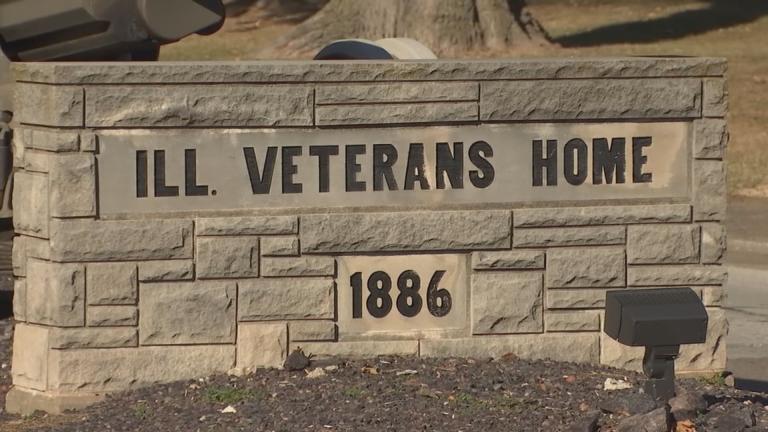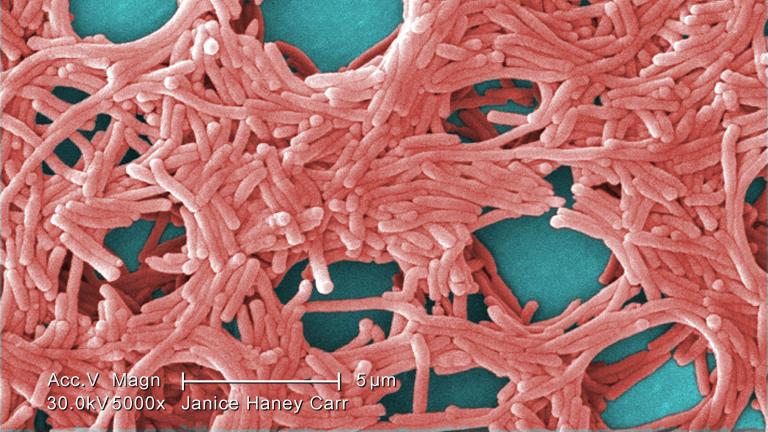As lawmakers spar over a Legionnaires’ disease outbreak at a veterans home in Quincy, we take a closer look at how the illness spreads and is treated.
Gov. Bruce Rauner on Wednesday wrapped up his stay in a state veterans home where 13 residents have died of Legionnaires’ disease since 2015.
While Rauner and his administration have defended their handling of the outbreak after WBEZ first reported on accusations of negligence, the governor announced that the state will replace plumbing at the Illinois Veterans’ Home in Quincy, which could cost up to $30 million. As state lawmakers debate how the outbreaks were handled, we look to provide some context on the disease and what causes it.
“I think if you tested every building, if you dug deep enough, you could find at least one cell [of Legionella bacteria] in every building everywhere. It’s that cosmopolitan,” said Ian Cull, owner of the indoor environmental consulting company Indoor Sciences. “The real risk, though, is not when you just have one little cell floating in a pipe somewhere in a building.”
What makes Legionella bacteria dangerous is what Cull calls the “unholy trinity” of water that’s warm, stagnant, and then gets aerosolized – sprayed into the air by anything from a shower to a hot tub to a fountain. Breathing in water droplets with Legionella bacteria – especially for people who are older, have an underlying health problem, or have a weakened immune system – can cause a form of pneumonia known as Legionnaires’ disease.
“It’s a more aggressive, more severe pneumonia. It can affect more parts of the lung,” said Dr. Emily Landon, hospital epidemiologist with University of Chicago Medicine. “We often have to give a lot of extra respiratory support. Only a small percentage of people with regular, everyday pneumonia end up needing things like a ventilator.”
The severity of the infection also increases the likelihood of the disease turning deadly. “About one in 10 people die of Legionella pneumonia,” Landon said. “If you happen to catch it in a hospital, when you are already probably sicker to begin with, the rate of death is actually one in four.”
While antibiotic treatment and respiratory support can be effective treatments, as with any disease the most effective treatment is to prevent exposure in the first place. But that’s not always a simple prospect.
“The water systems of every building are unique, and some buildings are more prone to having problems. As a general rule, the more complex a building is, the more nooks and crannies Legionella can hide out in and amplify,” Cull said. “For example, outbreaks in a single-family home are relatively rare, whereas you get into a hotel or into a hospital where you have lots of different rooms – sometimes these rooms are occupied, other times they go months without being occupied.”
Cull says Legionnaires’ disease sometimes flies under the radar because while it can have severe outcomes, the likelihood of exposure is low. But both Cull and Landon stress the importance of indoor environmental safety.
“You want to ask questions, for your loved ones going into nursing homes, about whether or not people get bed sores there. When you’re going to a hotel, (you want) to know whether anybody’s ever had bedbugs,” Landon said. “You also want to know if they make sure they have clean water and clean air. The built environment can pose a lot of risks to people, especially if you have underlying medical conditions.”
Related stories:
 New Plumbing Promised for Quincy Veterans Home
New Plumbing Promised for Quincy Veterans Home
Jan. 10: In the face of mounting criticism over his handling of a Legionnaires’ disease outbreak at a veterans home, Gov. Bruce Rauner on Wednesday promised additional upgrades to the facility.
 Official: State’s Response to Legionnaires’ Outbreak ‘Quick,’ ‘Decisive’
Official: State’s Response to Legionnaires’ Outbreak ‘Quick,’ ‘Decisive’
Jan. 9: Illinois Public Health Director Nirav Shah told lawmakers Tuesday that he’s “proud” of the government’s response to an outbreak of Legionnaires’ disease at a state veterans home in Quincy. But critics say it was a delayed reaction that put veterans at risk.
 WBEZ: Families Accuse State of Negligence in Veterans Home Deaths
WBEZ: Families Accuse State of Negligence in Veterans Home Deaths
Dec. 20: Thirteen veterans have died of Legionnaires' disease since 2015 at a state-run veterans home in Quincy. A new report by WBEZ reveals Illinois' top health official warned of the seriousness of the outbreak days before it was made public.








